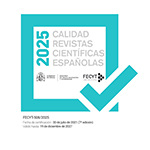Female, grief and Romanticism: a reflexive art history approach to a widow sculpture
Resumen
This paper aims to reflexively tackle a specific artwork: The Widow, the most renowned, yet under-studied, sculpture of António Teixeira Lopes, a prominent artist of the Portuguese nineteenth century. Therefore, the analysis of this piece, based on several inquiring procedures believed useful to all art historians, is converted into an epistemological exercise. Firstly, the Romantic sensibility is characterised, alongside the ponderment of the widow’s representational allure. Women and death’s perception in the nineteenth century is thus brought into question. Moreover, the social condition of widows and their identity codification is considered so that the relationship between reality and representation is critically appraised. Secondly, the focus shifts to the sculptor himself and his creative process. At the time living in Paris, his potential connections with death experiences, his professional goals and the pressure of the artistic environment contribute to explain Teixeira Lopes’ selection of this subject. Finally, the sculpture itself is thoroughly examined, questioning every formal choice and its meaning, searching for secular and contemporary visual stimuli which could have deliberately or unconsciously interacted within the creative process. To conclude, the need to approach an artwork simultaneously as unique and as a historical object in its turn chronologically transversal is stressed.
Descargas
Descarga artículo
Licencia
La revista Arte, Individuo y Sociedad, para fomentar el intercambio global del conocimiento, facilita el acceso sin restricciones a sus contenidos desde el momento de su publicación en la presente edición electrónica, y por eso es una revista de acceso abierto. Los originales publicados en esta revista son propiedad de la Universidad Complutense de Madrid y es obligatorio citar su procedencia en cualquier reproducción total o parcial. Todos los contenidos se distribuyen bajo una licencia de uso y distribución Creative Commons Reconocimiento 4.0 (CC BY 4.0). Esta circunstancia ha de hacerse constar expresamente de esta forma cuando sea necesario. Puede consultar la versión informativa y el texto legal de la licencia.










